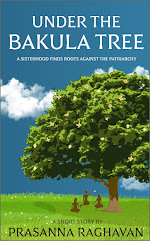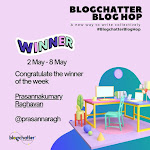Agency in storytelling and character motivation.
What is meant by agency?
Anticipating agency in life is humans' genetic disposition, but this cannot be met in our complex world. We can resolve this worry by reading stories written with deep structure or such stories that give us comfort and agency. Or, in a complicated world where humans' genetic disposition to feel agency is not met, they can find comfort in the stories they read.
In other words, in the vast savannas, those who looked around at the break of noise (a tiger) and took to run away lived longer than those who didn't follow suit. Humans have learned to look for a reason for anything happening around us- for causality. This is also a social learning.
 |
| Image credit to Gregory Fullard Unsplash. |
So, by having agency, "We look for the person or thing responsible for any action or phenomena we experience: we seek to ascribe agency to what we perceive." In other words, We humans have a built-in predisposition to expect agency.
As I said, having an inbuilt safety mechanism is an advantage in human life. However, this safety mechanism has complex ramifications in our lives, which I will discuss later. Here, we look at how stories provide readers with agency.
I mentioned earlier that humans want to feel agency in every incident or happening in their lives. In reality, however, this expectation is not met. Our lives and the world are too vast and complex to understand the agency or what causes every phenomenon. This puts us in perpetual insecurities and makes us scared to live in a complicated world where we do not feel agency in everything happening around us.
 |
| A World of Complexity Image credit to Casey Homer Unsplash |
Don't worry about that because we have the stories. They are the best bet to help us escape this fear of randomness. They provide us with a feeling of agency and security, comfort and interest. In other words, a story progressing without agency does not interest us, as it does not provide comfort and escape. Stories also provide us with the best survival chances.
So, the stories immerse us in a world of comfort and security, in the natural world of complexities and fear. The question is, How do they do that? They give us the 'why factor' or the cause and effect in their deep structures.
Characters with agency.
We all know what story structure means. A critical step in story structure is character motivation. The characters in a story should have agency. In other words, "a character's agency is the capacity, condition, or state of acting or executing power." The protagonist's action is determined by their agency.
A character with agency acts and sets a chain of events, and the story progresses to reach the goal. If they do not have the agency, they cannot get the goal themselves; they only allow things to happen to them. They only perform in the 'bystander' role as someone should come to assist them, and the story turns dull.
I want to bring in some problems in creating female characters who are not entitled to agency in the society in which they live. Anna Mazzola writes about the complexity of assigning agency to female characters whose "lives might well have been heavily circumscribed with male family members making decisions as to who they should marry, and where and how they should live."
Such was a situation I faced while considering my protagonist. The protagonist in my novella, Under the Bakula Tree, is a female living under male and family control. Imagine if I did her act against circumscribing society and a family, executing powers to move ahead and achieve her goal of freedom and love. That would not be agreeable to society and the readers. The story would be flawed. But I gave her the desire, the sisterhood I created, did the act, and achieved the goal. I read Mazzola's post long after I published my story.
Gossip and character motivation.
One clue the facilitators in our creative writing course indicated was to eavesdrop on others using the available chances. Say when you're in a restaurant. As storytellers, we are trying to figure out the motivations in others' lives.
We are social beings. We live in societies, and we all gossip, which has a purpose. Gossip helps us understand the motivation of others in our social group so that we can adapt our actions to bring the best result for us. Stories are similar but work by examples. The characters in the story do not live in our society, but figuring out their motivation gives us comfort and a feeling of safety and helps us learn social skills.
The purest form of storytelling.
The purest form of storytelling is the most post-popular stories. Crime stories are considered the purest form of storytelling and the most popular. There is causality, characters have agency and motivation, and there is no redundancy. The story events progress to fulfill character motivation. Every scene will explain why a thing happens and give the readers clues regarding the story's outcome.
Conclusion.
We are talking here about agency; we have a genetic predisposition to expect agency. Unfortunately, in a vast life of complexities, we cannot fulfil this expectation, which causes perpetual insecurity and fear. Stories, in their deep structures, provide us with a solution.
The critical factor in the story structure is character motivation. Characters with agency and desires can drive the events in a story to achieve goals and give us agency and comfort in the random, complex world. Motivated characters provide us with comfort and social skills. They help us survive in a fearful, complex society.
Have you encountered a problem of creating a protagonist with no agency in their social life? How have you overcome that?








28 comments
Thank you explaining this. Despite having written multiple stories and books I wasn't aware of all this.
ReplyDeleteHi, I am delighted to read that statement from you, the author of multiple stories that put you at a high pedestal. I feel happy to share something authors might find useful in their writing journey. :)
DeleteI'm learning something new here.
ReplyDeleteHi, I want to copy-paste the reply I posted to Manali. "I am delighted to read that statement from you, the author of multiple stories that put you on a high pedestal. I feel happy to share something authors might find useful in their writing journey. :)"
DeleteThank you for explaining this concept its so insightful.
ReplyDeleteThank you for heightening my motivation. :)
DeleteThis was such an interesting post. Loved the bit where you spoke about how, as a writer, one can attribute agency to seemingly powerless women characters.
ReplyDeleteIndeed before I read on it I had no clue about how that part should be dealt with in story writing.
DeleteLearning the terms that go into making a book, is certainly good information. I have never thought of characters and situations in technical terms, and all these help when you make a conscious effort to craft a compelling story.
ReplyDeleteYeah, you're right about that; story-writing has become technical compelling us to be uptodate about that.
DeleteA very interesting commentary on how to provide agency to characters in your stories - and consequently how to take it away.
ReplyDeleteThank you Suchita to know that you appreciate that point; how to provide agency in your stories.
DeleteThis is altogether a different subject related to books which I was not aware about although a regular reader and writer for years. Thank you for sharing such interesting facts.
ReplyDeleteI am happy to hear that you got to read something different and interesting in my post. Thank you :)
DeleteI am sorry to say that this was too complex for me as a non- literary person to understand , but I am glad that you wrote this Prasanna because after reading and rereading , I did get some insight into character building and how agency is very important when it comes to the art of story telling.
ReplyDeleteSorry that you found the subject too complex. Glad that you got some insight into a few matters. They are truly technical matters.
DeleteThis is an insightful post. Wasnt aware of human instinct for agency and causality and how it is traced back to our evolutionary need for survival. Learnt something new today! Thanks Prasanna.
ReplyDeleteThis is an insightful post. Wasnt aware of human instinct for agency and causality and how it is traced back to our evolutionary need for survival. Learnt something new today! Thanks Prasanna.
ReplyDeleteHappy to know Shilpa that my post was of use to you. As I have mentioned earlier, I was also not aware of these points before I read about them.
DeleteAbsolutely fascinating exploration of agency in storytelling and character motivation! The evolutionary aspect of seeking agency and the role stories play in providing comfort amid life's complexities is well articulated. Your consideration of societal constraints on female characters and the delicate balance in character motivation is thought-provoking. The connection between gossip, character motivation, and social skills adds another layer to the narrative. A compelling discussion on the essence of storytelling and its impact on our understanding of agency in a complex world.
ReplyDeleteWow! You have beautifully summarised every highlight of that article. Thank you so much and am happy to know you have appreciated the post.
DeleteVery insightful explanation on agency and how to use it when developing characters.
ReplyDeleteI liked the example you gave of your story to elucidate your point. learnt something new about the agency today
ReplyDeleteThank you for your appreciation. When I got confronted with that aspect in my story, I found nothing to guide me, and I am happy that I found it later.
DeleteGood article! Agency and character motivation are so important. It brings to mind the debate about passive and active characters - it's never fun and interesting when things happen to a character, rather it is the character who should take action in accordance to their motivation and drive.
ReplyDeleteThat is very true, what is said about the character who drives the story.
DeleteYour entries are always so interesting. I am not an author and found this concept of agency in writing intriguing. Would love to check out your book too.
ReplyDeleteThank you very much, Ritu. The notion of agency is helpful not only to the authors, but to reviewers as well. Please do check out my book, I am looking forward to know your views. That is my debut e book. You can learn a lot from your debut work to avoid the mistakes in future. :)
ReplyDeletePost a Comment